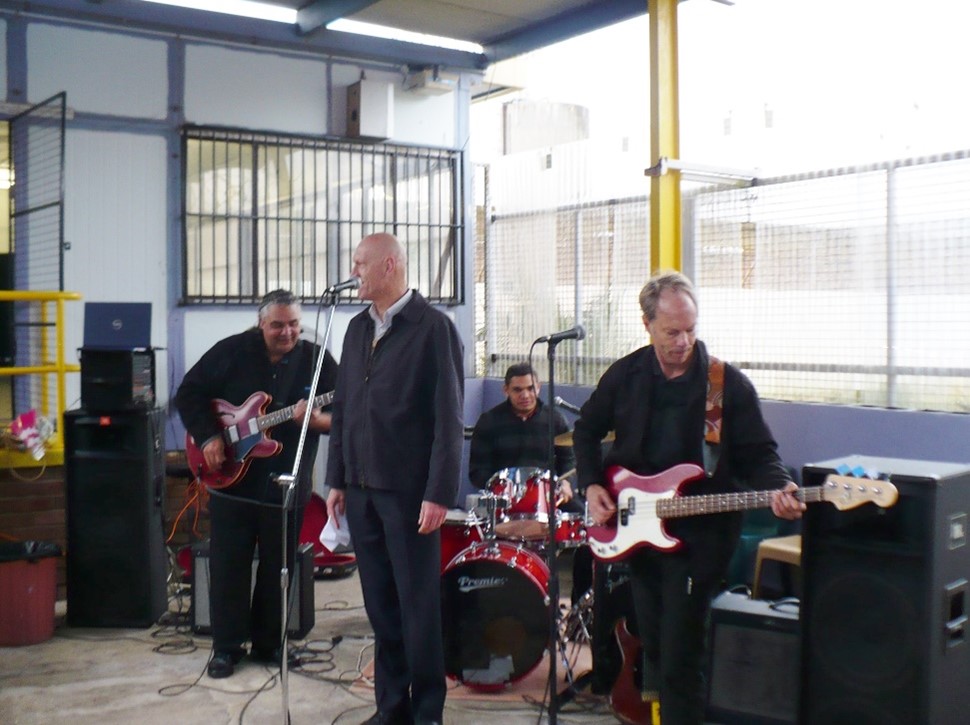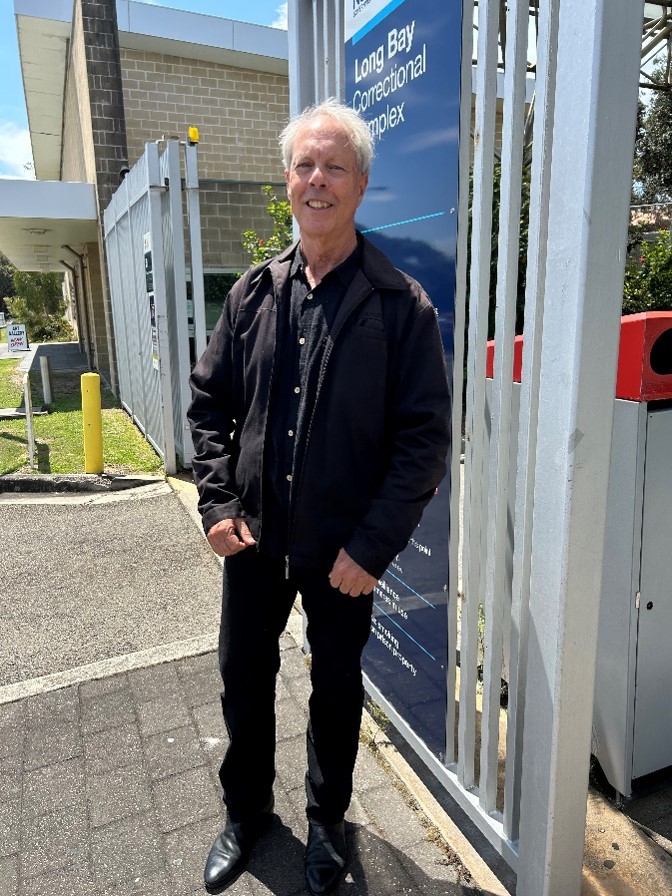Automatic language translation
Our website uses an automatic service to translate our content into different languages. These translations should be used as a guide only. See our Accessibility page for further information.
3 June 2025
As the son of a Family Law Court judge and an English teacher/concert pianist mother, Murray Cook had a privileged upbringing. Add to this a career in marine biology and as a bass guitarist with Aussie rock band Midnight Oil, he had all the hallmarks of success. But a kinship with people in custody saw his life path turn on a dime.
It is clear when speaking with Murray Cook what makes his heart sing.
Certainly, being an early member of Midnight Oil is up there with career highs. So too is saving the mangroves of Botany Bay as a marine biologist.
But if you really want to see joy, ask him about his work teaching music and songwriting to inmates.
“I love so much the looks on their faces when they learn a song or I loan them a guitar to look after.
“I’d record the songs in gaol then take them home and mix them with good backing music, electric guitars and drums, studio effects to make their voices sound big.
“What I love about the job is the honesty of the lyrics and their voices. These people have lived really hard lives. To get up and sing into a mic, some of them for the first time, they are astonishingly good singers.”

Murray was raised on Sydney’s North Shore and educated at Sydney Grammar School, dividing his spare time between surfing, footy and lessons in flute, clarinet and piano.
Exceptionally intelligent he studied marine biology at the University of Sydney where he won the University Medal for science and graduated as a marine biologist along with his friend and now Deputy Commissioner Luke Grant. There were hopes Murray would follow in the footsteps of his father, barrister Adrian Cook QC.
But Murray lived by the ethos of doing things that make you happy, and life in a suit was not one of them.
While studying at uni, he hooked up with Rob Hirst who was playing in up-and-coming band, Midnight Oil.
When the band’s original bass player moved on, Murray was brought on board.
“It was in those first couple of years and we played the local pub circuit. It was very exciting,” he says.
“I remember when (lead singer) Peter Garrett shaved his head. He had really long, white hair. One day he just showed up with a shaved scone.
“Then he skulked around the stage the way he did. The audience freaked out. With the lighting the way it was, he looked like Frankenstein.”
On finishing his degree, Murray stepped back from music and worked with NSW Fisheries as a research biologist. But then major job cuts were announced and he threw it all away in disgust, and returned to music.
He toured with the Warumpi Band, a largely Aboriginal outfit, and moved to Arnhem Land. Returning to NSW, he formed Sydney band Mixed Relations, and taught music at Redfern TAFE.
In 1994, at age 37, his world was rocked when his partner became pregnant with their first child.
“It was a case of having a child on the way, not having much money and thinking, ‘I have to be responsible now. I need to find stable work’. “
Then a friend, Rachel Perkins, who was doing a doco at Long Bay Hospital, said they needed a music teacher. It came at the right time.
“At first I was apprehensive thinking, ‘Middleclass white boy, these guys will eat me alive’. But I really enjoyed it. It was part-time at first which was fine as I was playing with Mental As Anything.”
In 2016, the teaching staff in NSW prisons were cut and Murray was again at a turning point. But fate stepped in when he was head-hunted by the Community Restorative Centre to become an arts and music program coordinator, which included prison song-writing.
“Through this program, I got to see the other side, what happens to people when they reintegrate back into society. Music is a good thing. Upon leaving custody, offenders have the option of teaching music, becoming DJs, sound guys, roadies.”

Periodically, Murray would pull strings to introduce staff and inmates to some of his famous friends. “During NAIDOC Week at Broken Hill, Midnight Oil were in town and I bumped into the boys on the street. I told them we were doing a prison concert and said, ‘What are you doing tomorrow?’
"They said they’d just got off the plane from Europe and were really tired, but would see how they went.
“We had the concert and right at the end they still hadn’t shown and I thought, ‘Well, that’s it then’.
“All of a sudden there was this huge commotion and I saw this bald head come through the gate. The boys sat down, had some bush tucker and chatted with everyone. It was brilliant.”
Then there were the notorious inside characters who were among Murray’s students.
“It’s very confronting but never boring in gaol. I got to work with Neddy Smith and Roger Rogerson. Neddy was our librarian, we called him Conan the Librarian – everyone was so scared of him they'd always return their library books on time.
“Neddy loved music and always came to my classes. Roger was one of my best students. He was a very good classical pianist. He’d get on the piano and play Hello Dolly and My Way.
“One day I noticed a guy sitting up the back. He was wearing a bucket hat and dark glasses and was reading this thick book, tapping his feet to the music and smiling. It was Ivan Milat.”
An unfortunate by-product of Murray’s rock and roll lifestyle was drug addiction.
“Being in the music industry there’s so many drugs around and you just get sucked into it and get dependent.
“Working in the gaols, it’s been an important part of my recovery. Talking to other people with similar stories, it really helped me so much. I get inspired by these people. It takes away all your judgment and arrogance.
“I’ve grown so much from the experience. I’ve been clean and sober for many years now. But this job, teaching music in prison, it really saved my life."
After 30 years in the prison system, Murray is now contemplating retirement. “I’m finishing with participants of a violence prevention program at Long Bay, ending my career back where I started.”
A lasting legacy are the Songbirds CDs he produced which feature more than 100 original songs by inmates.
“My last CD is called Ladybirds, all the songs recorded from the past year during a prison tour working with some great performers including Amy Shark and Nancy Bates. I went around to the women’s prisons and got them to write songs.
“It’s sponsored by CSNSW and scheduled for release in November. The songs are absolutely incredible.
“All up, we’ve sold about $8,000 in CDs and albums, which is channelled back into the program.”
Looking back, Murray is grateful for his experiences. “I just feel very blessed to have been able to pass on all that I have learned.”
Learn more about the Songbirds albums on the Bandcamp website..
Last updated:
We acknowledge Aboriginal people as the First Nations Peoples of NSW and pay our respects to Elders past, present, and future.
Informed by lessons of the past, Department of Communities and Justice is improving how we work with Aboriginal people and communities. We listen and learn from the knowledge, strength and resilience of Stolen Generations Survivors, Aboriginal Elders and Aboriginal communities.
You can access our apology to the Stolen Generations.